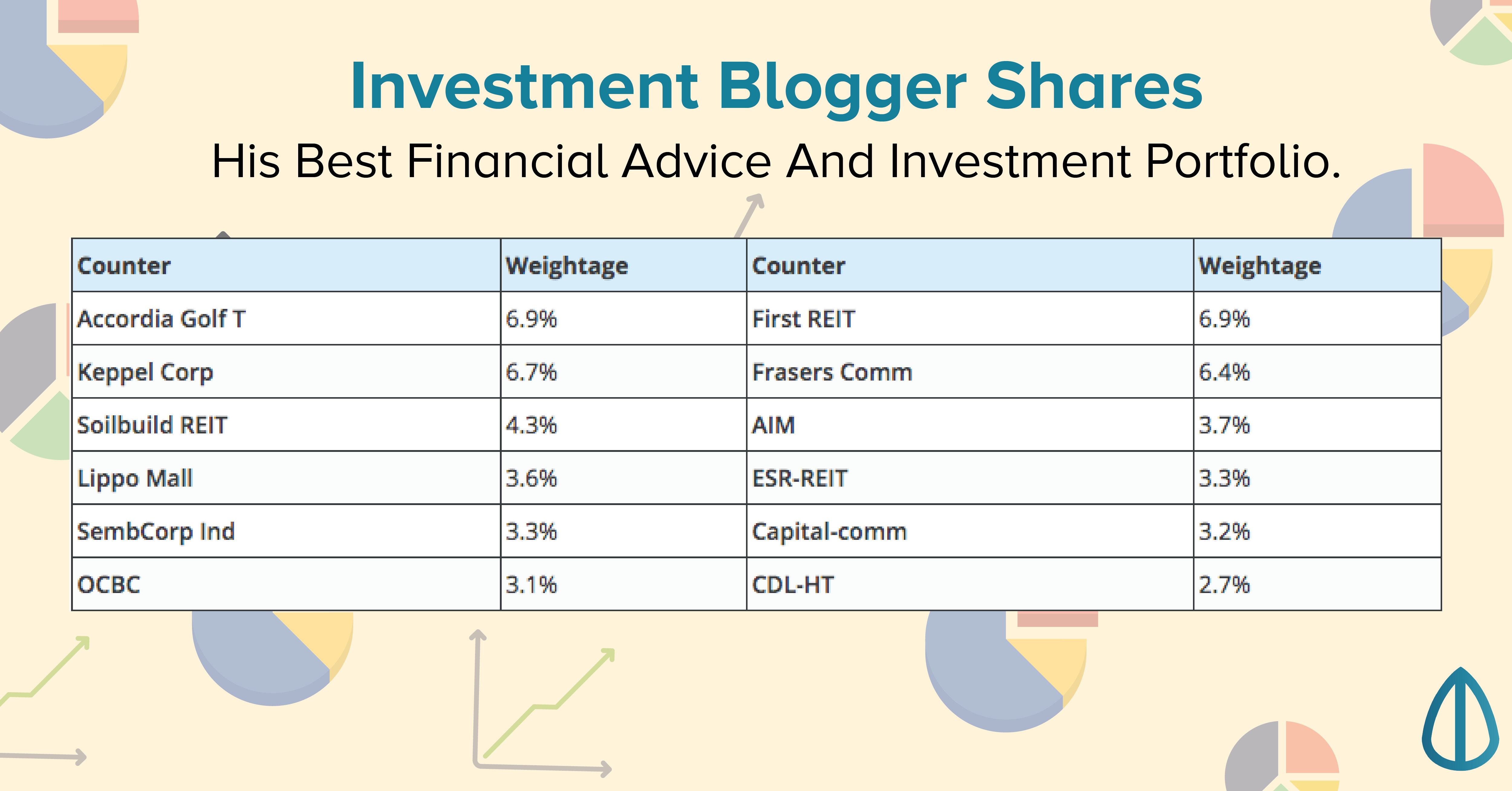Advertisement
Anonymous
Is fee based financial advisory a good career if I wish to provide unbiased finance advice to people?
I really enjoy sharing what I learn about personal finance with my friends and think that I wish to make it as a career. However I wish to be as unbiased as possible if I were to embark on this career.
18
Discussion (18)
Learn how to style your text
Christopher Tan
07 Jun 2019
CEO at Providend Ltd
Reply
Save
Wilfred Ling
07 Jun 2019
Professional Fee-based Financial Planner at The IFA on Duty
Hi,
If you want to provide unbias advice (in any industry), you need to be unbiased yourself. Your question itself is already loaded with biasness because it is assumed that only a fee-based adviser can provide unbiased advice.
Whether is it fee-based or commission based, it is a form of renumeration system. The renumeration system does not make a person good or bad. A person is good because he has decided to do so. A person is bad because he has decided to do so. The ability to provide an unbiased advice is a personal choice, and not due to the renumeration system.
Nevertheless, if you charge a fee, your scope of advice will be expanded so that it becomes more holistic and comprehensive. A holistic and comprehensive advice is always better than narrowly focus.
Many financial advisers want to move to a fee-based renumeration system for the wrong reasons. The wrong reasons are:
- Want to provide unbiased advice . I always asked them why they can't provide unbiased advice in their present situation. I often found out that the real reason is poor persuasion skill resulting in poor production (hence the pressure to sell more commission paying products to make up the low productivity). Thus, the problem is that of a poor persuasion skill. Moving to a fee-based system does not solve the fundamental problem. In fact, it is made worst because you now need to persuade your prospect to pay you a fee.
- Does not want to do sales. This is also the wrong reason. A salesperson can be good or bad. It is a personal choice. Moreover, it is not true that the fee-based adviser is not selling anything. He is basically selling a financial plan to his customers. If the customers 'buy' his financial plan, they will achieve their financial goals. If the financial planner cannot persuade his customers to implement his financial plan, his customers' problems remains and the financial planner has failed in his duty.
There are basically two obstacles why the fee-based industry could not take off in Singapore:
- One reason is that the incumbents are refusing to change. In a fee-based system, the financial planner is renumerated by the client. He does not need to sell products to earn a living. Thus, the incumbents will lose the entire distribution channels and forcing them to sell direct. As direct selling will incur huge marketing cost with no guarantee of profits, they prefer to rely on commission based advisers who are only paid for each sale. In a commisison system, the incumbents' marketing cost is based on guaranteed results.
- Another reason is that there is very few advisers in Singapore who are doing fee-based. Without a critical mass, there is hardly anyone to guide newbies on how to go about doing it. Without a mentor, the newbie will be left in the dark to figure out how to do it.
There are also some misconceptions with regard to fee-based advisory.
- One misconception is that FinTech will take over the human adviser. Actually FinTech has already revolutionised the way financial advisers conduct their advisory business and it started more than 10 years ago already. Contrary to popular belief, it actually increases advisers' productivity to do better.
- Another misconception that there are so much information on the finance in the Internet that nobody is going to pay for advice. Contrary to popular belief, the Internet has resulted in a huge demand for fee-based adviser. The Internet contain so much information that it also contain what is irrelevant and false information. But what people want isn't more information, what they want is wisdom to know what is relevant and how to apply it. This is the ideal market for fee-based adviser.
- The final misconception is that people are not willing to pay. This is not true. The more educated a person, the more likely he is willing to pay for good advice. By my experience, the sandwich generation is more than willing to pay. However, the high networth is unlikely to pay for advice because they are used to getting so called 'free' advice. But what they do not know is that they are often ripped off by expensive products (so life is quite fair, the rich get ripped off and their money 'distributed' to others who need it. Haha, like robinhood).
I am not doing recruitment but if you wish to speak to me further, you can google my name on Internet to get hold of my contact. I can point you in the right direction. The most important is to join the right company. Your initial group of customers will be your own friends and relatives. If you switch company later, you would have abandon those who supported you.
Wilfred Ling
A fee-based financial planner for 12 years
Reply
Save
Family offices, fund management companies also work on % fee for AUMs. Market still used to getting advice from financial advisors for 'free' at this point although this is changing.
Daniel (google him) from DIYinsurance, is fixed salary but the company that pays him is still paid by insurance companies. I like that he speaks with so much passion about his job.
There is a market for your service. Especially comprehensive ones that looks into not just protection, but asset allocation, investments, generational wealth planning, wills, trusts/foundations, business continuity base on family needs, age and risk profile.
However, you really need to target a VERY SPECIFIC audience who knows, likes and trusts you to sustain a business. Become the valuable advisor people will pay to have you around.
The question then is - who do you want to serve?
Do you enjoy being with your chosen clients or just because they look glam?
Be so good in your chosen niche that they cannot ignore you.
Differentiate yourself by educating your market and give practical, high value, usable advice.
Let your free content be so good that your paid content or services or training will be so in demand people queue for it.
We treat those who treat us well. The law of reciprocity.
Reply
Save
Loh Tat Tian
07 Jun 2019
Founder at PolicyWoke (We Buy Insurance Policies)
I'm having the same interest as you too. But I think if you really want to do such personal finance, it's better to think, what other value can you give besides unbaised opinion?
A workshop? I am contemplating on setting up Insurance 101 for people to identify, breakdown Insurance policies, calculate ROI and have worksheets to go with such courses.
Reply
Save
Jason Sing
17 Sep 2018
School Of Hard Knocks And Life at School Of Hard Knocks And Life
Yes, it is good. However, the competition in the financial advisory services is very stiff and the t...
Read 5 other comments with a Seedly account
You will also enjoy exclusive benefits and get access to members only features.
Sign up or login with an email here
Write your thoughts
Related Articles
Related Posts
Related Posts
Advertisement










As a matter of interest, globally, there are three compensation methods in providing financial advice
Commission-based : Advisers are paid 100% by commissions
Fee-based: Advisers are paid by fees + commissions
Fee-only: Advisers are paid 100% by fees
It does not mean that an adviser who is paid by commissions is any less independent, honest or competent. However, because commission is a source of conflict, removing commission from advice not only give clients more assurances that advice will be independent of the product commission, it also takes away the conflict from the adviser. In addition, because the client pays fee for advice, there is a greater expectation from the client that the advice given must be worth the fees paid. As such, a fee for service adviser will have to ensure that the quality of advice given will meet his/her client's demands. Over time, this builds the adviser's advisory competence.
Providend is Singapore's first fee-only advisory firm. All our advisers do not take commissions for advice. We have been operating as a fee-only adviser since day 1 of our operation in 2003. After 15 years of our experience, my conviction is that while it is the best way to give advice, it is not the only way. This is because, it might not be suited for clients who have simpler financial needs. They should not need to pay fees for simple advice.
So depending on the type of clients you wish to serve, fee for service advice might be or might not be suitable. Hope this give some answers to your question.
You might also wish to read this article that I contributed to Sunday Times a few months ago and also various articles on our company website at www.providend.com
https://sg.finance.yahoo.com/news/know-financia...
Have a blessed day!